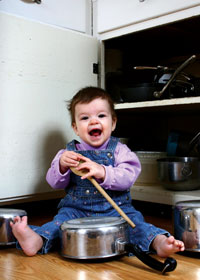A mother sings to quiet her colicky child. A father rocks his toddler to sleep with a lullaby. A preschool teacher sings the clean-up song as children shelve their toys. Like Mary Poppins, they’ve learned that one of parenting’s most powerful tools isn’t magic at all: It’s music.
 Music and children go together. Though the so-called “Mozart effect” — the theory that classical music builds children’s brains — has not been verified by scientific research, parents and children benefit from music in many ways.
Music and children go together. Though the so-called “Mozart effect” — the theory that classical music builds children’s brains — has not been verified by scientific research, parents and children benefit from music in many ways.
Babies start learning from music in infancy. When parents speak to babies, they use what experts call “musical speech” — a sing-song tone with exaggerated pitch and rhythm. As children grow, singing helps them learn other fundamentals of language, such as rhyme and phonemic awareness (differentiating the sounds within words). An Ohio State University study found that children were better able to learn and replicate patterns (an important math skill) when the patterns were presented musically. The same study noted something teachers already know: Children listen better to a musical lesson. “They enjoy the repetition,” says Bellevue preschool teacher Elaine Bassett, who uses songs to teach days, months and insect anatomy. “If you’re just talking, the children get bored, but if you sing, they enjoy it and want to repeat it.”
Sing more, nag less
Since singing captures children’s attention, parents can reduce nagging by singing. “When parents or teachers sing directions, as in “Let’s take a bath” or “Let’s eat our lunch,” a child is more willing to participate than if just words are used,” says Tacoma Kindermusik instructor Glenda Alley. It works the other way, too. Redmond mother Michelle Meyers, a former elementary music specialist, teaches her children to sing requests at the table, such as “May I have some milk, please?” “With a little jingle, it was easier for them to remember how to ask politely,” says Meyers.
Singing can replace instructions altogether if used as part of a routine. Bassett sings to signal clean-up time, snack time and time to go home. Juanita mother Kristy Lloyd sings “Let Us Gather in a Circle” to call her family for prayer. “Every child knows it and recognizes it, so we don’t have to nag and yell,” she says. “They just know it’s time by hearing the song.” She also uses it to remind children about routine events, such as swimming lessons, school or church, and loves how music helps her children prepare. “It’s like music muscle-memory.”
A helpful distraction
While music helps children pay attention, it’s also a useful distraction. “With a handful of songs, especially action songs, you can get through a whole lot of doctor visits, lines or car trips,” says Bassett. Lloyd sings to her crying baby in the car, and her other children sing along. “They all feel like they’re helping, even the littlest ones,” she says, “and it calms the baby down.”
This calming effect is valuable. Research suggests that music stimulates the body’s natural “feel good” chemicals, such as serotonin and endorphins. One study, described in the Southern Medical Journal, found that hospital patients who listen to music experience less anxiety and need less pain medication. At Children’s Hospital in Dallas, therapists use music to encourage children to express feelings of anger and sadness, and help them find an appropriate outlet for their feelings.
This works at home as well. When my daughter gets hurt, we sing the words “owie, owie” to a common melody, which distracts her from the pain and helps her control her reaction. Parents can try it, too: When I get frustrated by recalcitrant children, I start singing “I’ll Fly Away.” Singing about escape helps me almost as much as actually escaping, and it’s certainly more useful than yelling.
How to start
So what should parents sing? Sing nursery rhymes. Sing along to children’s CDs by artists such as Greg and Steve, Ella Jenkins or local musician Nancy Stewart. Sing clean-up songs, quiet songs or lullabies. One Kirkland father who didn’t know any lullabies sang the ABC song every night; this helped his son learn the alphabet quickly. Meyers recommends making up new words to suit your family, such as singing, “Julia wore some princess shoes” instead of “Mary wore a red dress.” Invite your children to make up songs, too; it encourages them to be creative and have fun with the music.
If you’re having trouble rewriting songs, try to match the stressed syllables. Slip a two-syllable name into “Twinkle, Twinkle, Little Star”:
“KAT-ie COME to DIN-ner PLEASE.”
A three-syllable name might fit into “My Bonnie Lies Over the Ocean”:
“Re-BEC-ca, please EAT your po-TA-toes.”
Bonus points for rhyming.
Whether you’re teaching, entertaining, distracting or comforting, music will help you connect with your children. Just keep singing.
Loralee Leavitt writes, plays piano and organ, and sings with her three children.











